
|

|

|

|

|
|
Thursday,
September 1, 2005
 Katrina
Relief -
The web is abuzz with efforts to publicize Katrina relief
efforts. Lots of choices available to those that want to
contribute. See an array at Instapundit.
A charity that I felt especially worthwhile, and to which I have
contributed is Soldier's Angels (click on their logo below)
Katrina
Relief -
The web is abuzz with efforts to publicize Katrina relief
efforts. Lots of choices available to those that want to
contribute. See an array at Instapundit.
A charity that I felt especially worthwhile, and to which I have
contributed is Soldier's Angels (click on their logo below)

|

|
|
Friday,
September 2, 2005
 Newer
Orleans - Even
while the waters are still flooding New Orleans, there is a growing
body of commentary that seeks to place the blame on the federal
government, for refusing to adequately fund levee construction in
years past, and even on George Bush, in particular. It is not
especially convincing, according to Duane
Freese, and I agree. But, I would take this one step
further. The problem isn't that the government is paying too
little, it really is a problem that it is paying too much.
Newer
Orleans - Even
while the waters are still flooding New Orleans, there is a growing
body of commentary that seeks to place the blame on the federal
government, for refusing to adequately fund levee construction in
years past, and even on George Bush, in particular. It is not
especially convincing, according to Duane
Freese, and I agree. But, I would take this one step
further. The problem isn't that the government is paying too
little, it really is a problem that it is paying too much.
The city of New Orleans is sinking. It
has been sinking for a long time. It will continue to
sink. Sounds like a bad place to put a city. Over time,
without federal support, we should expect that these people will move
elsewhere - maybe a little further inland, or maybe much farther away.
Plenty of federal money has been spent on
keeping the waters at bay in New Orleans, and there has been a
proposal to spend some $14 billion to shore up the coastal shorelines
in Louisiana. Congress has yet to approve such an expense.
Hopefully, they never will fund this project. If the residents
want to raise, and spend, this money, then fine. But, when the
funding comes from the feds, we treat it as if it were free.
Based on that simple calculus (free money), we are inclined to invest
in any project with a positive return, no matter how costly. You
cannot expect the recipients of free money to weigh the costs of their
decision - at least financially, they don't exist! We would be
better off just giving the city, and state, the money, to do with as
they see fit. I doubt that it would be used for coastal
shoreline restoration.
If federal politicians didn't aggressively pursue
money for pork-barrel projects, long ago the citizens of New Orleans
would have had to face the question of whether building levees was
worthwhile. I suspect they would have found it easier to move,
and, given enough time, this would have been facilitated without the
major disruption that looms on the present horizon.
In the weeks and months ahead, there will be
lots of calls to rebuild New Orleans. I hope we can sit back and
better evaluate this situation. A terrible tragedy has befallen
these residents - lets not repeat it. Another city, further
inland, on higher ground, perhaps to be called Newer Orleans, would be
my suggestion.
|

|
|
Saturday,
September 3, 2005
 Goddard's
a Pain in my Gas -
Arizona Attorney General Terry Goddard may want to become governor so
badly that he is willing to politicize any issue just to get
headlines. Either that, or he is just an idiot - I'll report,
you decide. His office just issued a press release titled,
"Terry
Goddard Presses Need for Price-Gouging Protection." I
don't know why it is that people won't recognize that politicians make
bad situations worse, not better. I'd trade a thousand
politicians for a million speculators. That would create as much
market stability as you can, given that these current disruptions are
beyond our ability to control.
Goddard's
a Pain in my Gas -
Arizona Attorney General Terry Goddard may want to become governor so
badly that he is willing to politicize any issue just to get
headlines. Either that, or he is just an idiot - I'll report,
you decide. His office just issued a press release titled,
"Terry
Goddard Presses Need for Price-Gouging Protection." I
don't know why it is that people won't recognize that politicians make
bad situations worse, not better. I'd trade a thousand
politicians for a million speculators. That would create as much
market stability as you can, given that these current disruptions are
beyond our ability to control.
Can Terry Goddard undo the damage done by
Hurricane Katrina? It's not rocket science - the answer is,
"No." Can he produce more gasoline by restricting its
price? No. Can he create shortages, long lines, black
markets and increased incivility through his actions? Yes.
"The oil companies should stop playing 'Can You Top This' and stick with the rules of supply and demand,"
Goddard is quoted as saying in the press release. We can only
hope for the day when the good Attorney General actually understands
the "rules of supply and demand." To help cue him in,
let's consider the events of the past week and how the market
responds.
A
natural disaster causes supply disruptions.
Well, that's what happened. We can't undo this. Suddenly,
we have a mismatch between resources available and resources desired,
i.e., supply and demand.
The
market responds by raising prices.
Yes, that's what happens. Why? Because there is less
available. So, now, we need to reallocate gasoline supplies
around the country and we need to find a cheap and efficient way to do
this. That is the inherent beauty of prices. They go up -
everywhere. We really don't want that next tanker truck heading
off to Marble Canyon, Arizona to restock their supply. We don't
want as many tankers coming to Flagstaff for a while. We want to
get gas diverted to where it is most valued. So, the price of
gasoline at my local Fuel Express rises to $3.09 a gallon. That
makes me reconsider my driving habits. It stretches out the time
before the owners will have to get a truck there to fill up their
storage tanks. Terry Goddard argues that the gas in the storage
tanks has already been paid for and that the owners should not be
allowed to charge a higher price than they did last week. He's
missing the point of what prices are all about - allocating scare
resources.
Regulating
the price of gas will exacerbate an existing problem.
If Goddard had his way, prices would not rise. Consumers would
not have any incentive to cut back on their purchases. In fact,
quite the contrary - knowing that gas stations will run out of gas, we
all have an incentive to fill up as much as possible. Gasoline
supplies will not be routed to the areas of greatest need, because
there is no incentive to do so.
"Price
gougers" are good for the economy.
Raising prices causes consumers to conserve, and to do more so over
time, and producers to produce more, and to look for alternatives
(shale oil making a comeback?). Prohibiting that is akin to
building an economic levee around the gasoline market. Even if
it keeps back the flood waters of supply and demand, eventually it
will get swamped, causing even more ruin and misery!
|

|
|
Sunday,
September 4, 2005
 The
Asian Hoard -
For some time there has been this idea circulating, mostly on the web,
that the Chinese (and Japanese) could ruin the U.S., financially, if
they decide to unload their stocks of U.S. Treasury Securities.
Today, that bogus notion was echoed in the editorial of the Daily
Sun:
The
Asian Hoard -
For some time there has been this idea circulating, mostly on the web,
that the Chinese (and Japanese) could ruin the U.S., financially, if
they decide to unload their stocks of U.S. Treasury Securities.
Today, that bogus notion was echoed in the editorial of the Daily
Sun:
| Something
as benign as a decision by the central banks of Japan and
China to stop buying U.S. treasury notes could start a chain
reaction that would topple everything. |
It doesn't surprise me that the editors of the local paper cannot
grasp economics, much less global economics. The concept they
need to learn is called "fungibility." It sounds like
some kind of odd disease, but it actually refers to the fact that a
dollar is a dollar is a dollar.
So, what happens if the Chinese decide to
"ruin" the U.S. by selling off their Treasury bonds?
Well, nothing! Except that their act will depress the price of
such bonds a bit and the Chinese take a capital loss. If you
believe that their action would have a huge impact on bond prices
(and, there is zero evidence that such is the case), then you are
saying that the Chinese will take an even bigger hit. The U.S.
economy isn't any worse off. Those bonds have already been sold
and the funds collected by the Treasury and used by the government to
finance its spending. It represents an obligation, with
principal payments due in 3 months, 6 months, 5 years, or 10 years,
depending on the maturity of the bond in question.
Nothing has changed except the owners of
these bonds. The Chinese sell these bonds - as the price gets
bid down, others buy them up. It is as simple as that.
There is a bit more to the story - what will the Chinese do
instead? Well, they will either buy some other financial asset
(e.g., French bonds, driving up their price, further costing the
Chinese) or they will have to buy foreign goods (i.e., our
exports). In the latter case, this would reduce our trade
deficit, which might make some people happy, but, which is a totally
arbitrary goal. [A trade deficit reflects the strength and
superiority of our financial instruments - that is, the U.S. is an
extremely safe place in which to sock away your savings.]
|

|
|
Monday,
September 5, 2005
 A
Break in the Action -
It's Labor Day! Time to get out and do something
different. Actually, I was out yesterday - hiking up Mt.
Humphreys, which, at 12,633 feet, is the tallest spot in
Arizona. Lots of folks on the trail, even though it was cloudy
early in the morning. We reached the summit at 11:00 a.m., when
the clouds were still above us. But, soon we were surrounded by
a gray mist and, at the first sound of distant rumbling, the peak
cleared off within a minute. Still, all the way down we passed
people headed up, despite the turn in the weather. We did hear a
few more rumbles of thunder, although they always seemed distant, but
we didn't see lightening. We started up at 8:22 a.m., from the
upper parking lot, by the Skyride,
and returned at 1:23 p.m., making this a 5 hour trip. Here are a
few photos - click on them for larger images. Go here
to see more pictures.
A
Break in the Action -
It's Labor Day! Time to get out and do something
different. Actually, I was out yesterday - hiking up Mt.
Humphreys, which, at 12,633 feet, is the tallest spot in
Arizona. Lots of folks on the trail, even though it was cloudy
early in the morning. We reached the summit at 11:00 a.m., when
the clouds were still above us. But, soon we were surrounded by
a gray mist and, at the first sound of distant rumbling, the peak
cleared off within a minute. Still, all the way down we passed
people headed up, despite the turn in the weather. We did hear a
few more rumbles of thunder, although they always seemed distant, but
we didn't see lightening. We started up at 8:22 a.m., from the
upper parking lot, by the Skyride,
and returned at 1:23 p.m., making this a 5 hour trip. Here are a
few photos - click on them for larger images. Go here
to see more pictures.
 |
 |
 |
|
Mt.
Agassiz with some snow. |
The
Inner Basin |
Climbing
to the summit - 12,633 ft. |
|

|
|
Tuesday,
September 6, 2005
 Sleep
Denied - The
Flagstaff City Council is set to tighten up the law prohibiting
"camping" (which may just be someone sleeping in a car)
within the city limits. As an interesting piece of irony, while
camping is prohibited on public and private property, there is nobody
to cite in the former case. That is, the "camper" is
not the liable party; rather, it is the land owner that is charged
with such an offense! So, if you are caught "camping"
on a public street, the city is at fault!
Sleep
Denied - The
Flagstaff City Council is set to tighten up the law prohibiting
"camping" (which may just be someone sleeping in a car)
within the city limits. As an interesting piece of irony, while
camping is prohibited on public and private property, there is nobody
to cite in the former case. That is, the "camper" is
not the liable party; rather, it is the land owner that is charged
with such an offense! So, if you are caught "camping"
on a public street, the city is at fault!
This certainly is an item we can file under
in the "Law of Unintended Consequences" folder. The
primary object of this law, in the first place, seemed to be the
people who were staying in their RVs overnight in the Wal-Mart parking
lot. By and large, they seemed like decent people. They
didn't really have a need for external facilities. They weren't
trashing the place, otherwise the management would have put a stop to
this activity. And, these people probably felt reasonably safe,
being that the area was well-lit, that there is some safety in
numbers, and that the store was open 24/7.
Well, thank god we got rid of this riff
raff! The law, as it currently stands, forces people to park on
city property (except for parks, where they can be charged), or head
off into the National Forest, or head down the highway to the nearest
rest area. Thanks for visiting Flagstaff and don't forget to
leave!
The City
Attorney claims that this action "will
help eliminate the large amounts of litter and human waste generated
by individuals illegally camping, enhancing the overall aesthetic
appeal of the City" and will "aid
in the prevention of fires, eliminating the danger posed by illicit
campfires." How odd. You would think that such
littering, and campfires, would already be illegal. Why not
punish the criminal act instead of the innocuous behavior? Well,
because it is easier.
Here are a couple more observations.
First, are the truckers that sleep overnight (or, even during the day)
at the Little America violating the law? Does the Little America
have a conditional use permit? And, when the weather is bad, say
when there is lots of snow and the interstates are shut down, there
are truckers (and others) sleeping overnight alongside the roads near
the exits. It seems to me that they, too, will be violating the
law. Sounds like a potentially big payday for the city! Of
course, we all know that under such circumstances, the law won't be
enforced. We do know that, don't we? Maybe the law should
be revised to include this section: Violators
will be punished, except when we decide to look the other way.
Secondly, I do observe, from time to time,
visitors to the city camped out in front of the home they are visiting
- in trailers or campers. They are usually quite discreet and
are not a bother to anyone. Obviously, they, too, are violating
the law and subject to penalties.
So, here is a radical idea - just prohibit
the offending behavior. I can, at first glance, see five
components to an effective law in this regard (however, I am open to
the notion that there is something I missed):
(i)
Identify the prohibited acts
- littering, obstructing public access, public urination (et al.),
fires, and whatever else should go here. [This is what we really
want to penalize.] (ii)
Make the penalties suitable
to prohibit these acts, with the additional proviso that any such
offenders are barred from camping within the city limits for a period
of six months. [This would help keep away serial violators.] (iii)
Allow camping on private property,
or on city streets in front of private property, at the discretion of
the property owner, but, making them also liable for violations
identified in part (i). [This would allow for uses that we
currently don't find objectionable.] (iv)
Allow camping on city property,
as long as there is no traffic danger, unless otherwise posted.
[This would allow for the situation that arises during harsh winter
weather.] (v)
Any such "camping" should be limited to vehicles and
trailers.
[That is, this camping is a temporary measure.]
|

|
|
Thursday,
September 8, 2005
 No
Shortage of Fuelish Politicians -
When the price of gas goes up, we seem to be able to count on one
thing - there is no shortage of politicians with bad ideas and no
shortage of bogus economic reasoning. I almost yearn for the day
when a politician just admits that they don't know anything, and that
they will lie to us on every possible occasion. Not only would I
vote for such a politician, I'm pretty sure I'd vote for him/her again
and again. But, back to gas, and the nonsense it induces . . .
No
Shortage of Fuelish Politicians -
When the price of gas goes up, we seem to be able to count on one
thing - there is no shortage of politicians with bad ideas and no
shortage of bogus economic reasoning. I almost yearn for the day
when a politician just admits that they don't know anything, and that
they will lie to us on every possible occasion. Not only would I
vote for such a politician, I'm pretty sure I'd vote for him/her again
and again. But, back to gas, and the nonsense it induces . . .
Bad
idea:
There is an effort to suspend, temporarily, gas taxes in
Arizona. This is being proposed by State Senator Verschoor (R),
with regard to state taxes, and by Representative Shadegg (R), with
regard to federal taxes. While the economic reasoning is sound -
these proposals will stimulate supplies and reduce prices* in this
market - the policy of eliminating a tax that is essentially a user
fee is untenable. The gas tax is an excellent example of a
revenue stream that is tied to specific (government) spending that is
directly related to our use of the product (gas). That is, the
more we drive, the more impact we have on the infrastructure of
roads. However, the more we drive, the more taxes we pay, which
are used to maintain, repair, and improve this infrastructure.
In a less-than-perfect world (where taxes are raised) this kind of
scheme is far preferable to one that uses general tax revenue for
general uses. If we want to debate about lowering, or raising,
this tax in some permanent fashion, then let's do so; otherwise, just
walk away from such hare-brained schemes. The
bogus economics:
Governor Napolitano (D) has opposed this tax cutting proposal. I
might be inclined to hold my nose and, with one hand, applaud her
position. But, her arguments are so specious, that I can't help
but think that she "learned" her economics from Attorney
General Goddard. In today's Daily
Sun, the governor's press spokesman, Pati Urias, is quoted as
saying, "Even if you
suspend the gas tax, it doesn't necessarily mean that the price is
going to go down. The distributors could just leave the prices
as they are."
This is worse than bad economics - it is just
plain stupid. Distributors don't set the price of gasoline - the
market sets the price of gasoline. If you don't believe me, then
why isn't the price of gas $4 a gallon? Or, $5 a gallon?
Or, $10 a gallon? Or, $100 a gallon? If they can set the
price, why didn't they charge $3 a gallon a month ago? A year
ago? Five years ago? Because, they can't set market
equilibrium prices. The only way in which the statement of the
governor's spokesman can be true is if (i) producers were just too
dumb to realize that they could be charging more; or (ii) the
government has set a price ceiling of $3 a gallon, in order to keep
gas prices from rising. Under either case, we would observe
gasoline lines, stations running out of gasoline and black markets for
gasoline. None of these things are occurring.
*Note that
this is the proper causal ordering of events. You cannot drive
down the price unless the demand falls (which these proposals are not
designed to do) or the supply increases. The chain of effects,
as outlined in the attached
graphical analysis, is that reducing taxes lowers the cost of
production, which boosts profits, which stimulates supplies, which
puts downward pressure on prices.
|

|
|
Friday,
September 9, 2005
 Take
Back the Memorial -
The ongoing plans for a memorial at ground zero in New York City have
generated tons of controversy for their political-correctness aspects.
Michelle Malkin has been keeping
track of this on her site. There is a rally scheduled for
tomorrow. To learn more follow the link below:
Take
Back the Memorial -
The ongoing plans for a memorial at ground zero in New York City have
generated tons of controversy for their political-correctness aspects.
Michelle Malkin has been keeping
track of this on her site. There is a rally scheduled for
tomorrow. To learn more follow the link below:

You can also read more on the proposed
memorial for the victims of Flight 93, which is shaping up to be
the artistic equivalent of getting a poke in the eye with a sharp
stick. Check out Zombie's
observations.
 Governor
Challenges Nature -
Governor Napolitano seems to draw inspiration from a bottomless pit of
crazy ideas. While yesterday it was about the price
system, today it is about nature. Should New Orleans be
moved, perhaps to a Newer Orleans? The
governor is quoted in today's paper as saying that talk of rebuilding
elsewhere is "fundamentally flawed." Writes Howard
Fischer, "[S]he said geography and meteorology is trumped by
something else: history." Is it even worth commenting
on? I suppose that this attitude is also a reflection of poor
economic schooling. The presumed benefits of "preserving
history" cannot possibly be worth the cost of rebuilding in the
same lousy location. Get a grip. It is especially unworthy
of taxpayer funds, although if you want to start up your own private
charity to rebuild New Orleans below sea level, go ahead.
Governor
Challenges Nature -
Governor Napolitano seems to draw inspiration from a bottomless pit of
crazy ideas. While yesterday it was about the price
system, today it is about nature. Should New Orleans be
moved, perhaps to a Newer Orleans? The
governor is quoted in today's paper as saying that talk of rebuilding
elsewhere is "fundamentally flawed." Writes Howard
Fischer, "[S]he said geography and meteorology is trumped by
something else: history." Is it even worth commenting
on? I suppose that this attitude is also a reflection of poor
economic schooling. The presumed benefits of "preserving
history" cannot possibly be worth the cost of rebuilding in the
same lousy location. Get a grip. It is especially unworthy
of taxpayer funds, although if you want to start up your own private
charity to rebuild New Orleans below sea level, go ahead.
|

|
|
Saturday,
September 10, 2005
 Stuber
Auction Remembers Lorraine Kerley -
If you have been to more than a few auctions, you know that the
participants become something of a surrogate family. You see
each other at least a couple of weekends a month, be it at an estate
sale or a storage unit auction. You contend with rain and sun,
wind and storm, and, on occasion, awful directions. You swap
stories about the bids of past auctions, both won and lost. You
wait, with what may seem an unending supply of patience, for items you
are interested in to cross the auctioneer's table.
Stuber
Auction Remembers Lorraine Kerley -
If you have been to more than a few auctions, you know that the
participants become something of a surrogate family. You see
each other at least a couple of weekends a month, be it at an estate
sale or a storage unit auction. You contend with rain and sun,
wind and storm, and, on occasion, awful directions. You swap
stories about the bids of past auctions, both won and lost. You
wait, with what may seem an unending supply of patience, for items you
are interested in to cross the auctioneer's table.
With the recent death of long-time auction-goer Lorraine
Kerley, the folks at Stuber
auction wanted to pay a special tribute to the loss of a member of
this extended family. Fittingly, they gave away cowboy hats, to
shade the weary eyes in what can seem like a marathon event, as a
small way in which to remember Lorraine. So it was that Bob and
Rusty, Marjie and Dot, Jan, Kirsten and Cathy not only handed out hats
but spoke fondly of Lorraine during the preview at today's
auction. Lorraine was always especially interested in clothing
and kitchenware, which could, in turn, be sold or given away, on the
Navajo Reservation. [Click on any image below to see a
larger view.]
|

|

|
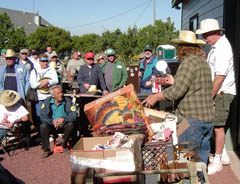
|
|
With
their registration numbers in hand, attendees gather 'round
for the start of the auction. |
Free
cowboy hats were given out in remembrance of long-time
auction-goer Lorraine Kerley. |
Rusty
and Bob begin the meticulous, and efficient, handling of items
available at today's auction. |
|

|
|
Sunday,
September 11, 2005
 Remembering
9/11 - Today we
do two things - remember the events of 9/11 and go on with our
lives. There is a lot to remember about 9/11, and there isn't
much I can add to that story. The Discovery Channel's presentation
of The Flight that Fought Back has been highly recommended by reviewers.
For a good reference source for lots of 9/11 reading, go to this Winds
of Change web site.
Remembering
9/11 - Today we
do two things - remember the events of 9/11 and go on with our
lives. There is a lot to remember about 9/11, and there isn't
much I can add to that story. The Discovery Channel's presentation
of The Flight that Fought Back has been highly recommended by reviewers.
For a good reference source for lots of 9/11 reading, go to this Winds
of Change web site.
One of the victims of the World Trade Center
attack was the remarkable Rick Rescorla. If you have seen the
Mel Gibson film, We Were Soldiers, you will know some of his
background. Read more at the Mudville
Gazette.
Rescorla was a Vice President of Security for
Morgan Stanley in the World Trade Center. He evacuated these
employees during the 1993 WTC bombing, and did so again in in the 2001
attack. A film airing today on the History  Channel,
The
Man Who Predicted 9/11, is about Rescorla, and how his
planning, and his actions, saved the lives of many thousands of people
on that fateful day. His wife, and others, have formed a
foundation to have a statue built in Rescorla's honor at Ft. Benning,
Georgia. Follow the link for more on this effort. Channel,
The
Man Who Predicted 9/11, is about Rescorla, and how his
planning, and his actions, saved the lives of many thousands of people
on that fateful day. His wife, and others, have formed a
foundation to have a statue built in Rescorla's honor at Ft. Benning,
Georgia. Follow the link for more on this effort.
|

|
|
Monday,
September 12, 2005
 Looting
and Finding -
In a letter to yesterday's Daily Sun
(which, as of this morning was still not posted up on-line), Carol
Thompson doesn't just blur the lines between reality and fantasy, she
blurs the lines between fantasy and insanity. While she may have
credentials in race-baiting, and consider herself a class warrior, her
international experience has, apparently, only eroded any appreciation
she might have for the scientific method, much less for logic and
coherence. Here is an excerpt:
Looting
and Finding -
In a letter to yesterday's Daily Sun
(which, as of this morning was still not posted up on-line), Carol
Thompson doesn't just blur the lines between reality and fantasy, she
blurs the lines between fantasy and insanity. While she may have
credentials in race-baiting, and consider herself a class warrior, her
international experience has, apparently, only eroded any appreciation
she might have for the scientific method, much less for logic and
coherence. Here is an excerpt:
| If
you are black and poor (race and class), beware. The
accelerating economic inequality, whether in The U.S. or
globally for Africa, condemns black folk not only to poverty,
but to oblivion. They don't exist, except when they are
"looting." AP sent out a picture of white
folks wading through water, after "finding bread and soda
from a local grocery store"; a similar AP picture of
black folks wading through water with provisions called it
"looting." |
Clearly, Ms.
Thompson isn't going to let facts get in the way of her agenda of
"Hate America First." The "looting" and
"finding" photos
she references are exactly what they purport to be and her attempt to
play them like race cards should fall on deaf ears. Consider
these points:
1. These
photos were taken by two different photographers, and they were the
ones that wrote the captions.
2. The
captions reflected what the photographer saw. In the case of
"looting" the photographer (Dave Martin) saw a man (one man,
not "folks") wading through the water, pulling along a large
plastic garbage bag (like a 30 gallon job).
3. In the case
of "finding" the photographer (Chris Graythen) saw people
wading down the street by a grocery store. The contents of the
store had, in part, been floating around the street and a woman in the
photo was carrying a loaf of bread and one other item, identified as
soda by Graythen. Read Graythen's comments here
(about halfway down the page).
4. In the
"finding" photo, the two people are not clearly "white
folks." The man is white, although it is not certain that
he and the woman are traveling together. The woman is of
uncertain ethnicity and may be white, or, perhaps Hispanic, or, even
black.
5. Finally,
the photos are not both from the AP. The "looting"
photo is from the AP, while the "finding" photo was
circulated by the AFP - Agence France-Presse. This tidbit of
irony may be lost on Ms. Thompson, but it isn't lost on me.
Ms. Thompson may
hate the Great Satan that is the U.S., but she can't blame the
problems of the world on America. The slaughter in Rwanda
(during President Clinton's tenure), the murderous events in the
Sudan, and the unfolding famine in Niger were/are tragic, but don't
automatically threaten U.S. security. If she wants to speak out
and organize private efforts to "give peace a chance," then
good for her. But, if Ms. Thompson is calling for U.S. military
involvement in these internal conflicts, in order to bring peace,
freedom, democracy and capitalism to these impoverished peoples,
perhaps she should detail that in a future letter.
|

|
|
Tuesday,
September 13, 2005
 Janice
Rogers Brown for SCOTUS -
I have been watching today's hearings on John Roberts nomination to be
Chief Justice of the Supreme Court. Fascinating stuff. The
abysmal
Janice
Rogers Brown for SCOTUS -
I have been watching today's hearings on John Roberts nomination to be
Chief Justice of the Supreme Court. Fascinating stuff. The
abysmal haranguing questioning by Senators Leahy and
Kennedy is just appalling. The TV talking head consensus is that
Roberts will be a shoe-in and that the Democrats are, by and large,
preparing to battle over the next nominee to the SCOTUS. And who
should that next nominee be? My vote (by a very wide margin):
 Janice
Rogers Brown
- former California Supreme Court Justice; recently confirmed
(after an interminable wait due to threats of filibuster in the
Senate) to the U.S. Court of Appeals for the D.C. Circuit. She
is the ideal choice, in my opinion. Her appointment would knock
both the race and gender cards out of the equation, or, would allow
those cards to played against the cabal of old white males - Kennedy,
Leahy, Schumer, Durbin, et al. She is tough as nails, having
really been to the school of hard knocks - born to sharecropper
parents in Alabama; being raised in California by her grandmother
following her parents' separation; marrying and having a child while in
college; her husband died of cancer leaving her to raise their son
while finishing her undergraduate degree and going to law school. Janice
Rogers Brown
- former California Supreme Court Justice; recently confirmed
(after an interminable wait due to threats of filibuster in the
Senate) to the U.S. Court of Appeals for the D.C. Circuit. She
is the ideal choice, in my opinion. Her appointment would knock
both the race and gender cards out of the equation, or, would allow
those cards to played against the cabal of old white males - Kennedy,
Leahy, Schumer, Durbin, et al. She is tough as nails, having
really been to the school of hard knocks - born to sharecropper
parents in Alabama; being raised in California by her grandmother
following her parents' separation; marrying and having a child while in
college; her husband died of cancer leaving her to raise their son
while finishing her undergraduate degree and going to law school.
Here is a passage from a speech
she gave in 2000 to the Federalist Society at the University of
Chicago Law School, as highlighted on Professor
Bainbridge's website:
| Writing 50 years ago,
F.A. Hayek warned us that a centrally planned economy is “The Road to Serfdom.” He was right, of course; but the intervening years have shown us that there are many other roads to serfdom. In fact, it now appears that human nature is so constituted that, as in the days of empire all roads led to Rome; in the heyday of liberal democracy, all roads lead to slavery. And we no longer find slavery abhorrent. We embrace it. We demand more. Big government is not just the opiate of the masses. It is the opiate. The drug of choice for multinational corporations and single moms; for regulated industries and rugged Midwestern farmers and militant senior citizens. |
Janice Rogers Brown is my kind of justice. Face it - Dubya is
going to get his hat handed to him if he selects another conservative
white male. But, a candidate like Brown, even though she had to
wait two years for the Appeals Court appointment to be confirmed, will
kick this debate into the stratosphere.
More links of interest regarding Brown:
The 'Golden
Eloquence' of Rogers Brown
In support of Janice Rogers Brown
Free Janice Rogers Brown
Wikipedia
entry
|

|
|
Wednesday,
September 14, 2005
 F-cubed
still too big for Flagstaff -
The Friends of Flagstaff's Future, or F-cubed, recently announced that
their membership now exceeds 1,000. This local activist group
generally opposes economic development and supports an environmental
agenda. It reminded me of a letter I wrote to the Daily Sun this
past April, in the midst of the Prop 100 campaign, which concerned
whether "big box" stores (i.e., Super Wal-Mart) would be
allowed in Flagstaff. Prop 100 would have capped retail space in
one store to 125,000 square feet and would have limited the amount of
space dedicated to groceries to 8% of the store's space. F-cubed
supported Prop 100, claiming that Wal-Mart killed off local businesses
and paid lousy wages . . . well, in general, Wal-Mart can be blamed
for all the ills in the world that can't otherwise be blamed on
President Bush. So, without further ado, a blast from the past .
. .
F-cubed
still too big for Flagstaff -
The Friends of Flagstaff's Future, or F-cubed, recently announced that
their membership now exceeds 1,000. This local activist group
generally opposes economic development and supports an environmental
agenda. It reminded me of a letter I wrote to the Daily Sun this
past April, in the midst of the Prop 100 campaign, which concerned
whether "big box" stores (i.e., Super Wal-Mart) would be
allowed in Flagstaff. Prop 100 would have capped retail space in
one store to 125,000 square feet and would have limited the amount of
space dedicated to groceries to 8% of the store's space. F-cubed
supported Prop 100, claiming that Wal-Mart killed off local businesses
and paid lousy wages . . . well, in general, Wal-Mart can be blamed
for all the ills in the world that can't otherwise be blamed on
President Bush. So, without further ado, a blast from the past .
. .
|
To
the editor:
I note that the Friends of Flagstaff’s Future supports Prop
100 and claims that this will help preserve the character of
our town. This is especially ironic, since F-cubed is,
itself, a big box, and is already degrading the quality of
life in Flagstaff.
F-cubed
claims to have over 900 members. That is far too many
for a town of our size. The insatiable appetite of this
behemoth activist organization is clogging up our
political system and choking off mom-and-pop activism.
If we could limit the size of F-cubed to 70-125 members, we
would see more activist competition and a more vibrant
community.
I would also note that there are many volunteers that work on
behalf of F-cubed for a salary of zero. That is worse
than a travesty. You cannot afford to live in this town
if you can’t even earn a positive income from the work you
do. Those that volunteer to work at Wal-Mart get paid
infinitely better than their counterparts at F-cubed.
Why, even workers in foreign “sweatshops” get paid more!
And one more thing – no more than 8% of F-cubed’s
finances, nor membership, should come from beyond the city
limits of Flagstaff. If you live in Kachina Village, or
Mountainaire, or Doney Park, form your own groups, and stop
trying to use your time and money to influence changes that
hurt the character of Flagstaff. |
|

|
|
Thursday,
September 15, 2005
 PC
problems today - blog postponed to Friday. Catch up with my
Antarctica journal: Cape
Royds PC
problems today - blog postponed to Friday. Catch up with my
Antarctica journal: Cape
Royds
|

|
|
Friday,
September 16, 2005
 When
the Logic Levee Falters - Part I -
The editorial in today's Daily Sun begins with a reference to the
fable about the emperor with no clothes and draws an analogy to
President Bush. Is it just me, or is this constant haranguing of
Dubya just insane? I am beginning to think that O'Reilly has
latched onto something with his Kool-Aid
references. It may be that the president is just an automatic punching
bag when it comes to any catastrophe, large or small, real or
imagined. And, as politicians like to take the credit even for
the sun rising in the morning, perhaps we are justified in blaming
them when it sets in the evening. Still, I just don't get
it. This behavior is not only short-sighted and unproductive,
but it is as insidious as a terrorist attack, in that it helps to
undermine our basic principles.
When
the Logic Levee Falters - Part I -
The editorial in today's Daily Sun begins with a reference to the
fable about the emperor with no clothes and draws an analogy to
President Bush. Is it just me, or is this constant haranguing of
Dubya just insane? I am beginning to think that O'Reilly has
latched onto something with his Kool-Aid
references. It may be that the president is just an automatic punching
bag when it comes to any catastrophe, large or small, real or
imagined. And, as politicians like to take the credit even for
the sun rising in the morning, perhaps we are justified in blaming
them when it sets in the evening. Still, I just don't get
it. This behavior is not only short-sighted and unproductive,
but it is as insidious as a terrorist attack, in that it helps to
undermine our basic principles.
And, what are those basic principles?
Well, the idea of federalism seems pretty clear to me. Governing
is, to a lesser extent than I would prefer, decentralized. The
federal government does not have unlimited power. In the case of
impending hurricanes heading towards New Orleans, the responsibility
for dealing with it start with the city and, then, moves to the
state. The feds may find ways to get involved unilaterally, but
they are supposed to defer to local governments, regardless of their
level of incompetence
and/or corruption.
Why isn't it Bush's fault? Well, let me
count the ways:
1.
The City of New Orleans had an evacuation plan, and didn't use
it. I would link to their plan, but it has been removed from
public access on the web!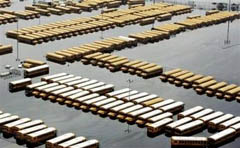 2.
Certainly you have seen the flooded buses. The fact that there
were people in New Orleans without adequate transportation is a
given. The mayor had access to these buses and didn't use
them. It is not a federal responsibility. Check out more
on this at Snopes. 3.
The governor turned down assistance and dragged her feet on requesting
federal intervention. That is her responsibility, not Bush's. 4.
And, as has been widely noted, if it hadn't been for President Bush,
it isn't clear that the mandatory evacuation would have been issued -
he is the one that pressed the governor and the mayor on this point,
before the hurricane hit.
So, by blaming Bush, logic and reasoning are just thrown out the
window. Apparently, the emperor really does have clothes, but
critics demand that he acknowledge that he doesn't. All of this
is starting to sound more and more like some show trial from the old
Soviet days under Stalin.
|

|
|
Saturday,
September 17, 2005
 When
the Logic Levee Falters - Part I I -
The
Friday editorial (9/16/2005) in the Daily Sun chastised President Bush
leadership in the aftermath of Hurricane Katrina.
As I noted yesterday, this is patently
unfair – Bush is not only the last one that can be blamed, in fact
he deserves credit for the arm-twisting he engaged in before the
hurricane hit.
When
the Logic Levee Falters - Part I I -
The
Friday editorial (9/16/2005) in the Daily Sun chastised President Bush
leadership in the aftermath of Hurricane Katrina.
As I noted yesterday, this is patently
unfair – Bush is not only the last one that can be blamed, in fact
he deserves credit for the arm-twisting he engaged in before the
hurricane hit.
There
is, however, more in this editorial that deserves comment.
It segued from the Katrina mess to their view that American
principles are insufficient and materialistic.
Here is the pertinent passage:
|
.
. . [J]ust as there may be lessons to be learned from the
Katrina disaster, so, too, there are lessons available from
our engagement with an anti-modernist Islamist worldview that,
even among its most progressive practitioners, doesn't lend
itself to western-style tolerance and democracy . . . [We] may
have to accept the fact that some societies will have
religious values that frustrate American appeals to
individualism and mass consumerism. That means that what
worked against Communism - dangling examples of political
self-determination and store-bought luxuries in front of the
indoctrinated masses until they threw off totalitarianism --
isn't necessarily going to work with Islam. |
America’s primary appeal to other people is our “mass
consumerism” and “store-bought luxuries?”
Is that why East Germans risked getting shot while crossing the
Berlin Wall? Is that why
dissidents in the old Soviet Union were carted off to real-life
gulags? Is that why
millions were murdered by Pol Pot and his henchmen?
I don’t think so.
We
have a history (though, not an unblemished one) of opposing tyranny,
oppression, authoritarianism, despotism, communism, and radical
Islamofascism. From the
Revolutionary War, to the Civil War, to the Great War, to World War
II, and, even, to the Vietnam War, despite the missteps, the chaos,
and the blunders, there was, at their core, our values and our
principles. What
principles are these? Well,
every year, the paper publishes them:
|
We hold these truths to be self-evident, that all men are created
equal, that they are endowed by their Creator with certain
unalienable Rights, that among these are Life, Liberty and the
pursuit of Happiness. --That to secure these rights,
Governments are instituted among Men, deriving their just
powers from the consent of the governed.
|
The point of the Declaration of Independence is that we do not
accept tyranny, whether under the guise of a slave-based Confederate
state, or a totalitarian Marxist state, or a murderous national
socialist state, or a fundamentalist Islamic state. The
Declaration is our line in the sand. It is a statement of how
our moral compass is set, even if we fall short of these precepts from
time to time. We may, or may not, choose to confront others in a
forcible manner on these points - we have in Afghanistan and Iraq, we
haven’t in North Korea and Iran. At least, not yet.
The American appeal is to liberty and freedom, not “mass
consumerism.” The logic
of the Declaration of Independence is that “these truths are
self-evident.” The only
“societies” that can “frustrate” a man’s desire to be free
is one that is based on authoritarian power, which is not why
governments are “instituted.”
|

|
|
Sunday,
September 18, 2005
 The
Market moves Faster than the (Daily) Sun -
The
web version of the Arizona Daily
Sun, Flagstaff's local paper, has an on-line poll about gas prices
that was still up this morning. The screen shot, below, I took
yesterday. The poll asks, "What lies in store for gas
prices?" The choices are:
The
Market moves Faster than the (Daily) Sun -
The
web version of the Arizona Daily
Sun, Flagstaff's local paper, has an on-line poll about gas prices
that was still up this morning. The screen shot, below, I took
yesterday. The poll asks, "What lies in store for gas
prices?" The choices are:
a) Level out at $3/gal."
b) Back to $2.50/gal.
c) Up, up and away.
d) We'll never see below $3 again.
Well, let's see, as of yesterday, gas was
running between $2.96 and $2.99 at every station I have seen around
town. That means answers a, c and d are just plain
fantasy. Granted, this poll has been up for a while, but these
three answers, which all posit that prices will be at, or greater,
than $3, have received 60% of the "vote." Only a
minority have voted that prices will fall, and, of course, the market
is already manifesting that outcome, even though there are still
serious supply disruptions from the Gulf of Mexico. At first
glance, I'd say that the 40% minority is about the same as the
proportion of Republicans registered in this area - coincidence?
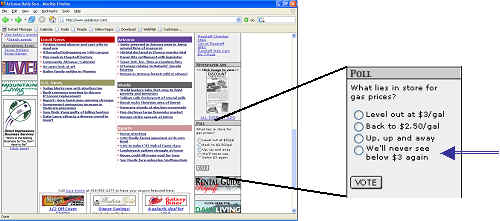
 A
Liberal Dose of Flagstaff may be Toxic -
Thanks
to Jack at Arizona Watch
for the plug
for the Kaibab Journal, and thanks to the nice comments from
Spectregunner and BridgetB. Jack writes, "[I]t’s a pleasant surprise to find that there’s a rational person among the tree-huggers in Flagstaff."
I wonder what gives him the idea that Flagstaff is full of flaky
people. Hmm . . . I wonder. Well, for starters, let's run
down the letters to the editor in today's
paper:
A
Liberal Dose of Flagstaff may be Toxic -
Thanks
to Jack at Arizona Watch
for the plug
for the Kaibab Journal, and thanks to the nice comments from
Spectregunner and BridgetB. Jack writes, "[I]t’s a pleasant surprise to find that there’s a rational person among the tree-huggers in Flagstaff."
I wonder what gives him the idea that Flagstaff is full of flaky
people. Hmm . . . I wonder. Well, for starters, let's run
down the letters to the editor in today's
paper:
"Gov't
tries to cover-up"
- about the
incompetence of the Bush administration with regard to hurricane
preparedness. No mention of local government shortcomings here,
as I have commented on. "Most
congressmen's kids not in Iraq"
- bemoans the fact that members of Congress, because they don't have
children serving in Iraq (the old Michael Moore bugaboo), makes their
decision to be there untenable. "Patriots
oppose war in Iraq"
- well, there you go. "Where
would we be without the GOP?"
- mostly, the writer concludes we'd have no war, no hurricanes and low
gas prices. "Impact
fees offset monopoly advantage"
- which rails against developers, who, apparently, storm the city
gates, build houses and then leave! "Bush
administration piling up scapegoats"
- where (ex-FEMA director) Michael Brown's intelligence shortcomings
are compared to George Tenet's. To bad that the author didn't
see fit to mention that Tenet was selected by Pres. Clinton.
OK, I fudged a bit - I left two out. One was on whether the new
city pool should be built on 4th Street, which begs the question of
whether we really should have the city build a pool, especially since
the city council already rations my water. And, the other letter
was a defense of the police chief in nearby Williams (30 miles west),
who tried to hide his checkered, and perhaps criminal, past.
|

|
|
Tuesday,
September 20, 2005
 Nothin'
in Nagin's Noggin? -
The
mayor
of New Orleans continues to make a Democrat of himself with his recent
efforts to re-populate New Orleans when it is still at risk,
especially now that Rita
is heading that way. He has been pressured by the feds to
postpone his plan, at least for now. This illustrates, yet
again, that it is local officials that (rightfully) are in control,
even if they are incompetent, and that the feds are there to
help. How has Ray Nagin distinguished himself so far?
Nothin'
in Nagin's Noggin? -
The
mayor
of New Orleans continues to make a Democrat of himself with his recent
efforts to re-populate New Orleans when it is still at risk,
especially now that Rita
is heading that way. He has been pressured by the feds to
postpone his plan, at least for now. This illustrates, yet
again, that it is local officials that (rightfully) are in control,
even if they are incompetent, and that the feds are there to
help. How has Ray Nagin distinguished himself so far?
Nagin
had to be pressured by a phone call from President Bush to issue his
emergency evacuation, which should have come hours earlier. Nagin
failed to insure that the emergency shelters were adequately stocked
with supplies. Nagin
failed to utilize the available buses to transport residents from New
Orleans. Nagin
failed to implement New Orleans' evacuation plan. Nagin
failed to control the police department as they left their duties,
ignored looters, and even participated in looting. Nagin
offered free Las Vegas vacations to the New Orleans police force a few
days after Katrina hit, even while the relief effort was in full
swing.
|

|
|
Wednesday,
September 21, 2005
 Porkbusters -
As noted on an earlier version of the Sidebar
readings, The
Truth Laid Bear has posted up a contributed
list of federal funding that bloggers recommend for cutting in order to fund the
Katrina cleanup. President Bush announced that he wasn't raising taxes
to fund this mess - the money would have to come out of current
spending, or through borrowing. So, the idea at TLB is to get
the blogosphere to kick in ideas for spending cuts from their locales
that could be redirected to the cleanup. The Kaibab Journal
(that's me) is proud to have made two entries on behalf of this
project (which I've lifted from one
of my virtual editorials):
Porkbusters -
As noted on an earlier version of the Sidebar
readings, The
Truth Laid Bear has posted up a contributed
list of federal funding that bloggers recommend for cutting in order to fund the
Katrina cleanup. President Bush announced that he wasn't raising taxes
to fund this mess - the money would have to come out of current
spending, or through borrowing. So, the idea at TLB is to get
the blogosphere to kick in ideas for spending cuts from their locales
that could be redirected to the cleanup. The Kaibab Journal
(that's me) is proud to have made two entries on behalf of this
project (which I've lifted from one
of my virtual editorials):
Buses
for Coconino County - $2 million -
Funds allocated for new buses. Not only is there nothing wrong with
the old buses, but they are hardly used anyway! The only reason we are
getting these buses is because they don't cost us anything.
Congressman Renzi's press release states that this will help
"reduce traffic congestion in both Flagstaff and Sedona."
No, they won't. Grand
Canyon Greenway Trail - $2.5 million
- Let's
cut to the chase . . .
1) Grand Canyon National Park has raised over $100 million in
"fee demonstration money" which could be wasted on this
project.
2) The park service just announced that the entrance fee to the Grand
Canyon will rise by 25% next year, further adding to this "fee
demonstration" slush fund.
3)
The portion of the greenway to be funded is from the visitor's center
to the nearby community of Tusayan - no views of the Grand Canyon -
just a pleasant 7 mile walk through the forest for those that would
rather not spend time actually looking into the Grand Canyon!
|

|
|
Friday,
September 23, 2005
 Democrat
Leaders MIA -
Ruth Bader Ginsburg was easily confirmed to the Supreme Court (18-0 by
the Judiciary Committee and 96-3 in the full Senate) because
Republicans found her to be “competent” even if they disagreed
with her views – in fact, even if they found her views to be abhorrent.
Why aren’t Democrats acting that way towards John Roberts? Is
it because they are (mostly) all hypocrites? When Pat Leahy is
the only leading Democrat to lend support to Roberts, it's time for
the Dems to hang out a "Help Wanted - Leadership a Must"
sign.
Democrat
Leaders MIA -
Ruth Bader Ginsburg was easily confirmed to the Supreme Court (18-0 by
the Judiciary Committee and 96-3 in the full Senate) because
Republicans found her to be “competent” even if they disagreed
with her views – in fact, even if they found her views to be abhorrent.
Why aren’t Democrats acting that way towards John Roberts? Is
it because they are (mostly) all hypocrites? When Pat Leahy is
the only leading Democrat to lend support to Roberts, it's time for
the Dems to hang out a "Help Wanted - Leadership a Must"
sign.
The
crybaby litany from Harry
Reid ("I was . . . swayed by the testimony of civil rights
and women's rights leaders against confirmation.") and Ted
Kennedy ("Nominees must earn their confirmation by providing
us with full knowledge of their values."), Diane Feinstein, Chuck
Schumer, Joe Biden, et al., just proves the point. They don't
care about competence, especially when they can just blather on with
their pious holier-than-thou sermons. One might think that the
fact that they control neither the White House nor either house of
Congress would give them some pause, and motivate a more humble
stance. Well, you'd think so.
And,
then, there are the recent comments made
by Supreme Court Justice Ginsburg. In opining on a woman to
replace retiring Supreme Court Justice O’Connor, Ginsburg said that “any
woman will not do” and
that those who would not do include those “who
would not advance human rights or women's rights."
Funny, I did not think that it was the purpose of the Supreme Court to
advance human rights. That is a legislative prerogative -
rightfully left in the hands of the people's elected
representatives. The purpose of the Supreme Court is to insure
that politicians don’t screw up the constitution, which they will
pretty much try to do at every turn.
So, while I hope RBG gets half of her wish -
another female justice - I hope she can learn to get along with Janice
Rogers Brown, who seems more interested in upholding and defending
the constitution.
|

|
|
Saturday,
September 24, 2005
 NAU
faculty senate - Getting Stuck on Stupid -
If ignorance is bliss, then the members of the faculty senate at NAU
that are supporting a “Resolution in Support of Affordable
Textbooks” (RSAT) are
especially . . . blissed. The resolution, which I don’t
believe has actually passed the senate, is a “textbook” example of
how an advanced degree is no insurance against a dreadful
understanding of how markets work. Some of my favorite passages
are:
NAU
faculty senate - Getting Stuck on Stupid -
If ignorance is bliss, then the members of the faculty senate at NAU
that are supporting a “Resolution in Support of Affordable
Textbooks” (RSAT) are
especially . . . blissed. The resolution, which I don’t
believe has actually passed the senate, is a “textbook” example of
how an advanced degree is no insurance against a dreadful
understanding of how markets work. Some of my favorite passages
are:
|
Whereas,
textbook publishers use gimmicks to increase the price of
textbooks…
Whereas, textbook publishers add bells and whistles to
textbooks …
Whereas, textbook publishers put new editions on the market
frequently…
Whereas, textbook publishers are unfairly charging students at
a time when tuition and other college costs are rising… |
For readers that don’t otherwise understand the obscure world of
university classroom textbook adoption protocol (UCTAP), here is quick
synopsis – faculty are assigned to classes and, then, they pick a
textbook to use. It may, at first glance, strike you as funny
that book publishers play no role in this UCTAP. Apparently the
members of the faculty senate don’t think it’s funny - book
publishers must be 100% to blame for all of the ills that follow from
this protocol. If, however, you are thinking that the primary
blame must fall on the shoulders of professors and the university,
well, you’d be right. But, there is no mention of lazy
professors and culpable university bureaucrats in the RSAT.
And, what does the RSAT ask be done? Here are more passages:
|
"Resolved,
the Faculty Senate calls upon college textbook publishers to
adopt the following practices:
-
To
keep the cost of producing textbooks as low as possible
without sacrificing educational content;
-
To
give faculty and students to option of buying textbooks
separately, without additional bells and whistles;
-
To
keep textbook editions on the market as long as possible
without sacrificing the educational content;
-
To
pass on cost-savings to students once purely online
textbooks are on the market.
|
From Basic
Economics 101
–
 markets reward
producers that keep their costs low;
markets reward
producers that keep their costs low;
 markets reward
producers that provide consumers with what they want;
markets reward
producers that provide consumers with what they want;
 markets reward
producers that can extend the lifecycle of their products;
markets reward
producers that can extend the lifecycle of their products;
 markets punish
producers that price their product higher than that charged by a
competitor.
markets punish
producers that price their product higher than that charged by a
competitor.
Although in a different context, I think we can adopt General Honore's
maxim for this waste of time, energy and effort - “You are stuck on
stupid.”
|

|
|
Monday,
September 26, 2005
 Remembering
the crew of the B-24 -
I took a hike yesterday to the site of the B-24 crash, which occurred
almost 61 years ago to the day - September 15, 1944. It takes a
bit of off-trail
work to find this site. Behind
the wing, shown in the picture at right, is the Navajo Army Depot, in
Bellemont, a fitting backdrop as a memorial to the crew of this
flight. For extended comments and additional photos, go to Remembering
the B-24 Crew.
Remembering
the crew of the B-24 -
I took a hike yesterday to the site of the B-24 crash, which occurred
almost 61 years ago to the day - September 15, 1944. It takes a
bit of off-trail
work to find this site. Behind
the wing, shown in the picture at right, is the Navajo Army Depot, in
Bellemont, a fitting backdrop as a memorial to the crew of this
flight. For extended comments and additional photos, go to Remembering
the B-24 Crew.
|

|
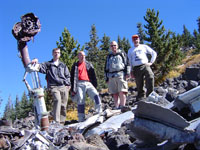 |
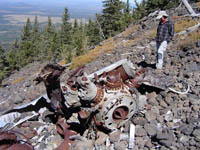 |
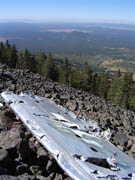
|
|
Click
on any photo to see a larger image. |
|

|
|
Wednesday,
September 28, 2005
 Grand Canyon:
Access-Challenged -
The editorial in last Sunday's Daily Sun
concerned the increase in fees at Grand Canyon National Park, and the
uses to which these monies will be put. On the one hand, it is
heartening to read that the editor(s) believe that raising prices will
hurt visitation, especially local visitation.
Grand Canyon:
Access-Challenged -
The editorial in last Sunday's Daily Sun
concerned the increase in fees at Grand Canyon National Park, and the
uses to which these monies will be put. On the one hand, it is
heartening to read that the editor(s) believe that raising prices will
hurt visitation, especially local visitation.
That being said, the editorial goes on to
bemoan the plan to use this money to fund a meek bus transit system
that would provide relief during the busiest times of the year.
The Daily Sun's motto here is that a world-class wonder deserves a
"world-class mass transit system." Clearly, this is
just empty rhetoric. If one were to apply this distorted logic
to its absurd end, we would have to support not only a world-class
mass transit system, but also a world-class hospital, schools,
housing, food service, hotels, entertainment - anybody really ready
for Wayne Newton playing the Hindu Amphitheater?
What's
wrong with mass transit? Besides
the fact that people don't like it, don't want to use it, that it is
slow and, in general, in a questionable state of cleanliness?
Well, it also will deter local visitation. Does
anyone understand that time really is money?
Even if the feds completely paid for a rail system, and visitors
didn't have to spend any more for entrance fees, it still would be
costly for local residents to make a "spur-of-the-moment day
trip" to the park. You would have to park in Tusayan, at
the rail terminus. You'd have to wait for the train. If it
is the busy season, you might have to wait for a second train.
You will board with, potentially, hundreds of other visitors, also
waiting for the train. Then, you'd have to go where the train
goes. If you wanted to take a day trip to the park and do some
sightseeing along the West Rim Drive, say at Pima Point, it will take
a while. First, take the train to the
Visitor's-Center-that's-not-really-a-visitor's-center.
Then, take the train to the 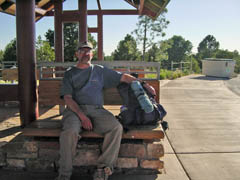 Village.
You might also have to take a bus. Then, hoof it to the West Rim
bus staging area. Then, get on the West Rim Shuttle and wait
about 40 minutes to get to Pima Point, which is about 6 miles
away. To get back, repeat this process, in reverse. Village.
You might also have to take a bus. Then, hoof it to the West Rim
bus staging area. Then, get on the West Rim Shuttle and wait
about 40 minutes to get to Pima Point, which is about 6 miles
away. To get back, repeat this process, in reverse.
And, while you're hanging around the Village,
you might think twice about buying something like a tee-shirt, or a
book about the canyon. That's because your car is seven miles
away, and you'll have to lug your purchases around until you
leave. No quick trips to the car to store purchases. No
access to a cooler you might have brought, so that you could picnic
at/near the rim.
The Grand Canyon doesn't need a
"world-class mass transit system." What
it does need is world-class access.
Unlike museums and monuments, the Grand Canyon is huge. It is
big enough so that infrastructure improvements can be made to
accommodate rising visitation levels, without adversely affecting the
quality of the visitor's experience. In fact, doing this would
improve the deteriorating service visitors currently encounter at the
park today.
Oh, yes, that's
me in the photo, waiting for a second bus to get me back to the
Village from the South Kaibab Trailhead. In case you were
wondering . . . No, it wasn't a world-class experience. The
waiting, that is.
|

|